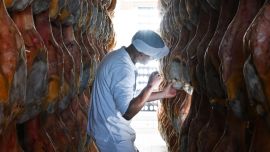The Bible tells us: “The days of our age are threescore years and ten: and though men be so strong that they come to fourscore years, yet is their strength then but labour and sorrow; so soon passeth it away, and we are gone” (Psalm 90, the Tyndale version). That rendering of the famous verse curiously omits the female gender with lower life expectancy until little over a century ago, so does that mean that Vice-President Cristina Fernández de Kirchner, who tomorrow reaches her threescore and ten (curiously enough all the Argentine presidents in the 16 years between 2003 and 2019 were born in the shortest month of the year) is immune from its strictures – or indeed any limits?
Tomorrow’s birthday is no mere number for her because it represents her “Get out of Jail Free” card in her personal game of Monopoly (how appropriate a word for her take on politics!), ensuring nothing more than house arrest in the worst of outcomes in the numerous corruption trials facing her – in turn a far from minor detail because her quest for impunity has constantly been the tail wagging the dog of the current administration.
The following column in honour of the occasion will not be any structured chronicle of her political career and far less an official biography – for that (and indeed an ultra-official biography) the reader can always consult Wikipedia whose information on local politics has long been colonised by La Cámpora militants. Instead this will be an entirely personal account of how the lady entered my radar, to which I might add that we never physically shared space – unlike her husband, with whom I not only had a face-to-face encounter but pressed flesh. The occasion was the 90th anniversary of the German Chamber of Commerce in 2007 which I was covering for the Buenos Aires Herald – spotting a tall, white-haired man in a suit on the fringe of the group, then-president Néstor Kirchner assumed that I must be an important German businessman and crossed the room to shake my hand warmly several times although not exchanging any words since also assuming that I knew no Spanish.
My first awareness of the existence of Cristina Fernández de Kirchner dates back just over three decades at one of the first Oxford & Cambridge dinners at the British Embassy residence following the resumption of Anglo-Argentine relations in 1990. There I befriended a Patagonian farmer John Blake (a direct descendant of Oliver Cromwell’s admiral Robert Blake, who pioneered the concept of navies as floating artillery in the 17th century) who owned extensive properties around San Julián in Santa Cruz. Striking up a conversation with my fellow-Cantab, I asked him how things were going down there. He replied that the province was run with an iron hand by its Peronist governor Néstor Kirchner but he was far more alarmed by his not so better half. Just short of calling her “toxic,” Blake described Cristina as a “piece of work” with boundless ambitions – an unstoppable force of nature. Prophetic words to which I paid little heed at the time.
My next perception came after she entered the Senate in 1995. After the glory days of the Herald under Robert Cox during the 1976-1983 military dictatorship with fearless investigative reporting, the newspaper gradually morphed into translating cables with high-quality armchair analysis as its main strength, especially when run by my reclusive fellow-columnist James Neilson, but there were sporadic attempts to return to tapping the outside world. One of these saw the former Reuters employee Guillermo Háskel hired towards the end of the century with strict instructions to steer clear of newsroom work and stick to outside reporting. In recent years Cristina Fernández de Kirchner has avoided interviews like the plague (a silence only broken in the weeks following the attempt on her life last September) but she was the complete opposite a quarter-century ago and the garrulous senator for Santa Cruz soon became a pet touchstone for Háskel. Half the time he crossed my field of vision in the newsroom he was on the blower consulting Senator Fernández de Kirchner, interviews which invariably took the same form – Háskel popping a question and then just standing there seemingly for hours listening to an endless monologue. If she could dedicate so much time to our minor medium, how much more for the big boys?
In 2007 she reached the presidency (with INADI anti-discrimination institute president María José Lubertino insisting that any suggestion that this had anything to do with being the wife of the previous president rather than her own exceptional talents was akin to gender violence). In the eight years of her presidency the Herald published 2,882 editorials, the vast majority written by this columnist and a huge percentage centred on her – impossible to condense all that in this space.
Instead this column will conclude with one final anecdote to underline the birthday girl’s lack of concision – “brevity is the soul of wit” said Shakespeare and “lo bueno, si breve, dos veces bueno” they say in Spanish, all foreign to the thinking of Cristina Fernández de Kirchner. In 2015 an Afro-Asian envoy (who, unlike Blake and Háskel, will not be further identified to preserve diplomatic immunity) started his mission here in late February so that Cristina’s state-of-the-nation address to open Congress on March 1 was his introduction to Argentine public life. After sitting through all 225 minutes, a stunned envoy could only conclude: “No wonder her husband died!”
But not quite the conclusion. If in her comments on Argentina’s Qatar World Cup triumph Cristina Fernández de Kirchner enthused far more over Lionel Messi’s “Qué miras, bobo?” vulgarity than over his superlative football skills before adding: “Whoops, I almost forgot, thank you very much also for bringing the fatherland its third World Cup,” so here I should add: “Whoops, I almost forgot, a very happy birthday to you, Madam Vice-President.”



















Comments